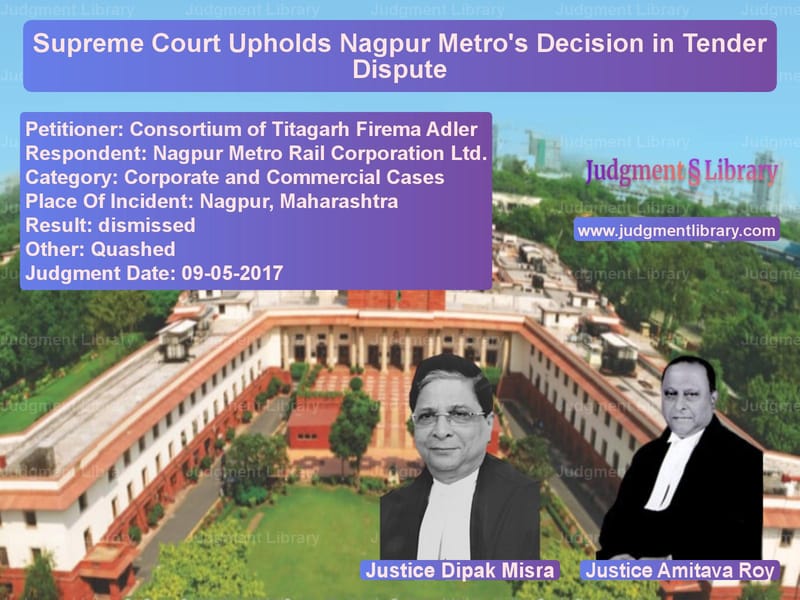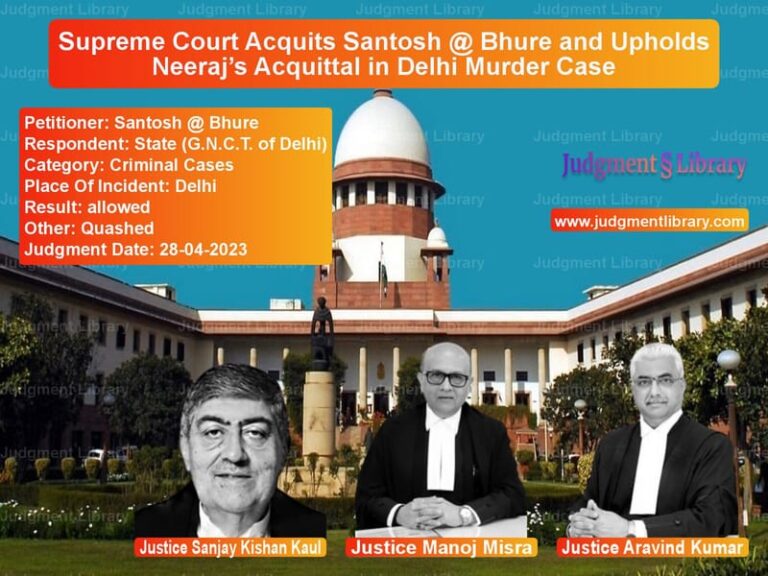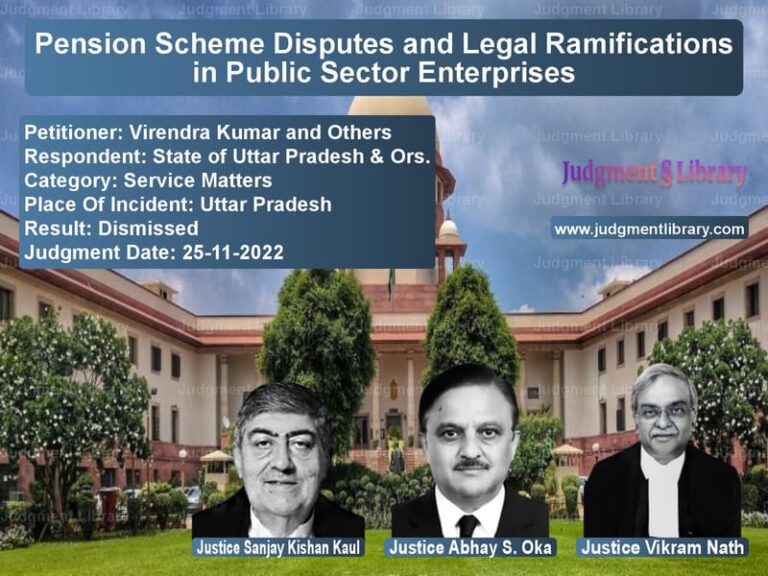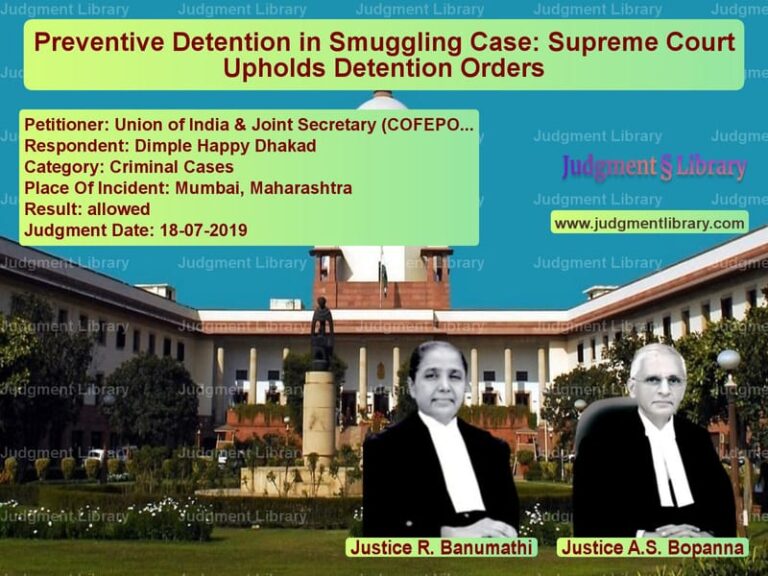Supreme Court Upholds Nagpur Metro’s Decision in Tender Dispute
The Supreme Court of India, in its judgment dated May 9, 2017, in the case of Consortium of Titagarh Firema Adler vs. Nagpur Metro Rail Corporation Ltd., ruled in favor of Nagpur Metro Rail Corporation Ltd. (NMRCL) and upheld the decision to award the metro rail project to the lowest bidder. The Court found no arbitrariness or bias in the tender evaluation process and dismissed the petition filed by Titagarh Firema Adler challenging the eligibility of the winning bidder.
Background of the Case
Nagpur Metro Rail Corporation Ltd. (NMRCL) issued a Notice Inviting Tender (NIT) on January 25, 2016, for the design, manufacture, supply, testing, and commissioning of 69 passenger rolling stock (Electrical Multiple Units) and the training of personnel for the Nagpur Metro Rail Project. The project was funded by KfW Development Bank, Germany, and all stages of bid evaluation required a no-objection from KfW.
Three bidders participated in the tender process. One bidder was disqualified at the technical evaluation stage, leaving the appellant, Consortium of Titagarh Firema Adler, and the respondent No. 2, CRRC Corporation Ltd., in the competition. The financial bids were opened on September 29, 2016, revealing that the appellant had quoted ₹852 crores while CRRC had quoted ₹851 crores. The tender evaluation committee recommended awarding the contract to CRRC as the lowest bidder.
Legal Issues Examined
The Supreme Court analyzed the following key issues:
- Whether the eligibility criteria were correctly applied to determine the qualification of CRRC.
- Whether CRRC, as a single entity, could rely on the experience of its subsidiary companies.
- Whether the confidentiality clause in the tender process violated the principles of transparency.
- Whether the decision-making process was arbitrary, biased, or violative of Article 14 of the Constitution.
Arguments by the Appellant (Titagarh Firema Adler)
- The appellant contended that CRRC did not meet the eligibility criteria as a standalone entity.
- It argued that CRRC had relied on the experience of its subsidiary companies without forming a joint venture (JV) or consortium, which violated the tender conditions.
- The appellant challenged Clause 26 of the tender document, which prevented access to competitors’ technical qualification details before the contract award, terming it as arbitrary and lacking transparency.
- It alleged that the technical evaluation committee had overlooked key deficiencies in CRRC’s bid and had wrongfully declared it qualified.
Arguments by the Respondent (Nagpur Metro Rail Corporation Ltd.)
- NMRCL defended its evaluation process, stating that CRRC had met all eligibility requirements.
- It argued that CRRC, as a government-owned entity, was entitled to use its subsidiaries’ experience without forming a JV or consortium.
- NMRCL emphasized that CRRC had supplied metro cars to various projects worldwide, including to Noida Metro, and its qualification was reviewed by independent consultants.
- The tender process was vetted by KfW Development Bank, which gave its no-objection for awarding the contract to CRRC.
Supreme Court’s Observations
The Supreme Court carefully reviewed the tender documents, eligibility criteria, and the evaluation process. Key observations included:
- The confidentiality clause in the tender (Clause 26) was known to all bidders before participation, and challenging it after losing the bid was not justified.
- CRRC was a government-owned entity with subsidiaries forming a homogenous pool under its direct control. The Board of Directors of CRRC had the authority to oversee all subsidiaries, and thus, their experience could be counted towards CRRC’s eligibility.
- The tender evaluation committee had examined CRRC’s bid in detail and found it compliant with all technical and experience-related criteria.
- The entire evaluation process was reviewed by independent consultants and approved by KfW Development Bank, reinforcing the fairness of the decision.
- There was no evidence of bias, favoritism, or mala fide intent in awarding the contract.
Final Judgment
The Supreme Court ruled in favor of NMRCL and dismissed the appeals filed by Titagarh Firema Adler. The key rulings included:
- CRRC’s bid was valid and compliant with the eligibility criteria.
- The principle of “lifting the corporate veil” was applied to recognize CRRC and its subsidiaries as a single entity for qualification purposes.
- The confidentiality clause was upheld, as it was a standard practice in international tenders.
- The bid evaluation process was found to be rational and not arbitrary.
- The project was of public importance, and further delays due to litigation were not in the public interest.
Implications of the Judgment
This ruling sets a significant precedent for public procurement and tendering processes:
- Clarification on Government-Owned Entities: The judgment affirms that government-owned corporations can rely on their subsidiaries’ experience without forming a JV.
- Judicial Restraint in Tender Evaluations: The Court emphasized that tender decisions should not be overturned unless they are arbitrary or mala fide.
- Importance of Confidentiality Clauses: The ruling upholds confidentiality in bid evaluation to prevent undue influence and maintain fairness.
- Encouragement for International Bidders: The decision aligns Indian tendering practices with global standards, encouraging more international companies to participate in infrastructure projects.
Conclusion
The Supreme Court’s decision in Consortium of Titagarh Firema Adler vs. Nagpur Metro Rail Corporation Ltd. reinforces the principles of fairness, transparency, and efficiency in public procurement. By upholding NMRCL’s decision and rejecting the challenge by Titagarh Firema Adler, the Court ensured that the metro rail project proceeded without unnecessary delays. This judgment serves as an important precedent for future disputes involving government tenders and eligibility criteria.
Don’t miss out on the full details! Download the complete judgment in PDF format below and gain valuable insights instantly!
Download Judgment: Consortium of Titaga vs Nagpur Metro Rail Co Supreme Court of India Judgment Dated 09-05-2017.pdf
Direct Downlaod Judgment: Direct downlaod this Judgment
See all petitions in Corporate Governance
See all petitions in Mergers and Acquisitions
See all petitions in Company Law
See all petitions in Judgment by Dipak Misra
See all petitions in Judgment by Amitava Roy
See all petitions in dismissed
See all petitions in Quashed
See all petitions in supreme court of India judgments May 2017
See all petitions in 2017 judgments
See all posts in Corporate and Commercial Cases Category
See all allowed petitions in Corporate and Commercial Cases Category
See all Dismissed petitions in Corporate and Commercial Cases Category
See all partially allowed petitions in Corporate and Commercial Cases Category







